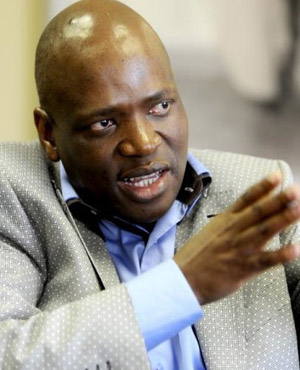
It is telling that the most enthusiastic celebrant of SABC boss Hlaudi Motsoeneng’s local content edict is a man whose career was buried alongside apartheid in 1994.
Mzwakhe Mbuli, whose poetry and music repertoire consists of his repeating things three times, had a hard time adjusting to a democratic era in which real creativity was required.
With no evil National Party leaders and Bantustan puppets to snarl at, the People’s Poet was forced to explore alternative career options.
But he turned out to be as bad at his new career as he was at music and poetry: he was arrested during his first bank robbery attempt and spent seven years in jail.
Since then, Mbuli has survived on odd jobs and has been lucky to have old comrades who have thrown him bones now and then. Then along came Motsoeneng and his 90% local music quota.
So excited was Mbuli at this turn of events that he composed a praise song for Motsoeneng and rounded up a group of musicians to sing it. Predictably, the chorus has this repetition routine: “Hlau-di, Hlau-di, Hlau-di, Hlau-di, thank you SABC.”
Admittedly, it is a tad unfair to focus on Mbuli. Motsoeneng’s decision received widespread acclaim. Artists, political parties and cultural organisations have applauded him for his “patriotic” decision, which, many say, will develop South African culture and put bread on local musicians’ tables.
There has been little appetite for any dissent on this emotive subject. Anyone taking a “let’s pause and think about this properly position” would have been a sellout.
However, for the sake of the SABC and our music industry, we must not be carried away by unsustainable populism.
In fact, the SABC itself was of this view in October when it argued against an Independent Communications Authority of SA (Icasa) proposal to increase local content to 70%.
According to Icasa’s report, as documented in the March Government Gazette, the “SABC is of the view that an increase of the local music quota should be based on music research with the public, thereby ensuring that radio stations respond to listener needs”.
“The SABC was of the view that 70% is high and will lead to loss of audiences. This proposed quota will hinder the growth of the public broadcaster ... The SABC has to be responsive to the needs of its audiences.”
The regulator took the SABC’s concerns on board and agreed to a 60% local content requirement for public radio, and 35% for commercial stations such as Metro FM and 5FM. These would be phased in over 18 months.
On the television side, Icasa set the local content minimum for public broadcast channels SABC1 and SABC2 at 65%, of which at least 35% must be South African drama. On commercial station SABC3, it set the quota at a weekly average of 45%, of which at least 20% needed to be South African drama.
It gave licensees 24 months from March this year to comply. Other programming, such as current affairs, documentaries, educational and children’s programming, would make up the rest of the content at varying percentages.
Now all these formulas were not arrived at through some thumb-sucking process; they were the result of research and scientific analysis of audience preferences, tastes and needs.
They were also informed by the need to sustain a viable public broadcaster that is able to meet its mandate while not being wholly dependent on the teat of the taxpayer.
As much as support for greater local content is correct and desirable, changes have to take into account the reality that audiences like to balance their consumption. They want to be served their Muvhango along with the Bold and the Beautiful; their maskandi with some R&B.
A succession of policymakers, experienced broadcasters and media strategists have applied their minds to the SABC recipe. By and large, it has worked, making the broadcaster’s radio and television outlets the first choice for millions of South Africans.
Quality may fluctuate between and within channels and stations, but the overall formula is working.
Political interference may have severely compromised news content and the loss of major sporting contracts may have weakened the corporation’s competitiveness, but the SABC is not broken.
Now you have one madman operating on populist whims, making far-reaching decisions that are calculated to earn him cheap popularity.
There are many crazy things that Motsoeneng has done that will leave the SABC hurting long after he has been dispatched to the Weskoppies Psychiatric Hospital, but his arbitrary messing with the formula will have the most destructive effect.
It is commercially destructive and will only play into the hands of the SABC’s rivals in the private sector. These players are gleefully rubbing their hands together, waiting to welcome the audiences, broadcast professionals and advertisers fleeing the SABC’s newfound myopia.
And when those artists ululating today wake up tomorrow and discover that the 90% share of local music and 80% of domestic content playing on SABC channels are being enjoyed by a rapidly shrinking audience, they will be queuing to offer Motsoeneng transport to Weskoppies.




 Publications
Publications
 Partners
Partners








